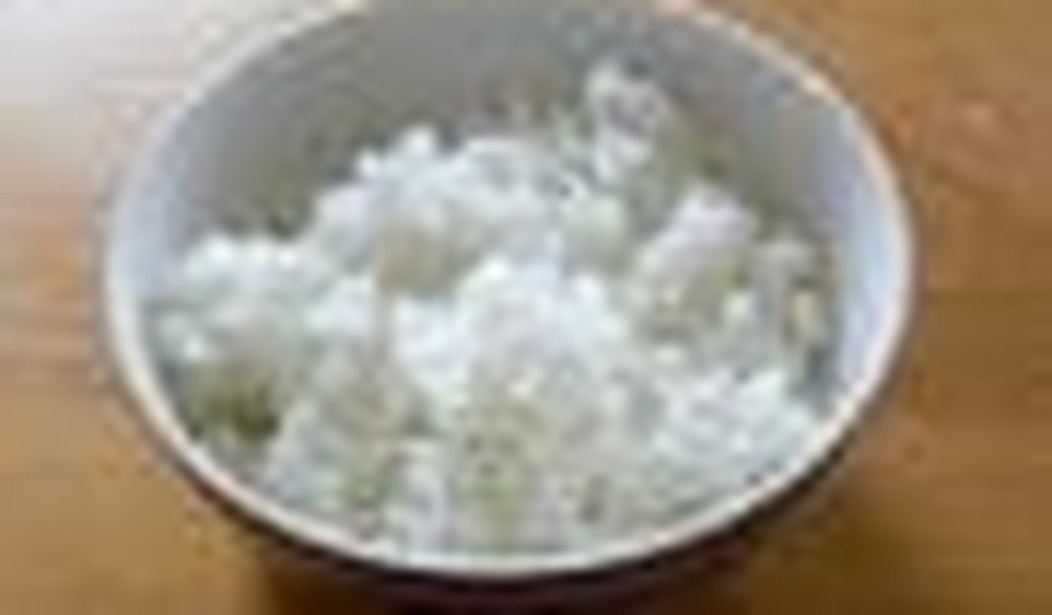Entire civilizations have been built on the stuff, but now it seems the world is running out of rice. Or is it? A year ago, the world had plenty of rice. Mothers hadn’t told children to clean their plates “because kids in China are starving” for almost 30 years. USA Today quotes economist Nathan Childs saying that U.S. production is “strong”:
The global crop is larger than ever, Childs said. But with some of the principal exporters of the higher-priced rices, such as India and Vietnam, shunning foreign sales to control prices at home and the cost of food generally going up, the price of rice has been climbing to new heights. What adds to the price spike — and the run on specialty products like basmati — is that rice consumers tend to be very loyal. The market is highly segmented by type of rice and quality, and buyers will generally not take a substitute, Childs said.
If people are still being picky, then by definition there’s no real shortage. Beggars can’t be choosers, after all. But that doesn’t mean prices aren’t spiking. So what’s really going on here? Something called “The Dissident Voice” claims that “unregulated greed unleashed over thirty years of neoliberalism” is to blame for the spike, adding that “Wall Street millionaires” would “let them eat ethanol.” That fact that ethanol is a creation of government subsidies, rather than of free markets, never seems to occur to The Dissident Voice. So I think we can safely dismiss kooky lefty conspiracy theories. Still, some folks blame ethanol. The Asian Development Bank said Monday that “developed nations should stop paying agricultural subsidies to encourage biofuel production because the payments are making staple foods more expensive.” I’m no fan of ethanol, or of government subsidies for that matter, but it seems premature to blame crop-switching before rice production has actually declined.
However, it is fair to complain that farmers might be planting extra — and extra profitable — rice fields, if Washington weren’t bribing them into growing corn to put in gas tanks instead of bellies. It’s with a straight face, and without complaint, that The Daily Green (no relation) reports:
Brazil announced yesterday that it would temporarily halt rice exports to ensure domestic supply as global prices rise, following on the heels of several Asian nations that have done the same.
The best way to alleviate a shortage is to take stuff from where there’s extra, and send it someplace else that doesn’t have quite as much. Usually, this is done in exchange for currency. We call this process trade, and it works best when people can do it freely. And so how are governments responding to the rice “shortage”? By restricting trade — keeping their extras and denying it to those without. It gets worse. Even though “adequate rainfall and sunshine have boosted yields” in India, the government still won’t allow any exports. Jimmy Carter tried something similar with gasoline — mandating that all stations stay filled up, even rural ones where demand was low — resulting in long lines in high-demand urban areas. CommodityOnline’s Gary Dorsch says it’s not just rice, noting that “soybeans are up 83%, corn up 65%, wheat up 95%, sugar up 30%, coffee up 25%, gold up 36%, and rough rice is 125% higher from a year ago.” And the dollar is down to record lows against — well, pretty much everything. The Fed has destroyed the dollar’s international purchasing power, with the connivance of an eternally overspending Congress. And we’re shocked, shocked when a weaker dollar means higher prices?
Let me rephrase — are we seeing a pattern here? Australia suffered a drought last year, curtailing production of thirsty, thirsty rice. Traders responded by driving up prices, and governments responded by enacting policies to restrict the very trade which could, and eventually would, drive prices back down. And what happens when people or their governments hoard stuff? Prices are driven up even further.
But the real proof is in the rice pudding. Is the rice shortage real? It sure is, if only just barely; demand is expected to outstrip supply this year by less than 1%. But like most shortages, this one is being exacerbated by politicians ignoring the most fundamental of all laws — the one of unintended consequences.
Stephen Green blogs at Vodkapundit.










Join the conversation as a VIP Member